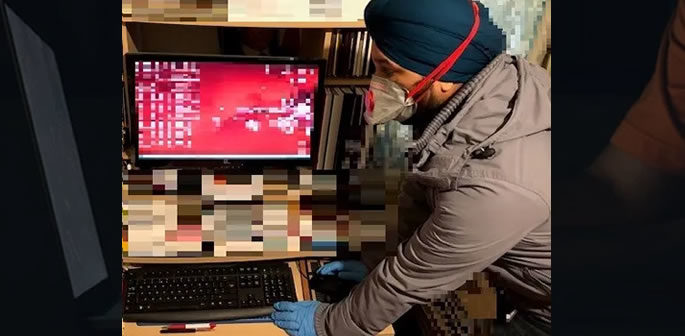"they can expect to come to police notice and face arrest"
Figures from the Met Police have shown that the Online Child Abuse and Exploitation Unit (OCSAE) has arrested 45 people and safeguarded almost 100 children during the four weeks since the UK went into lockdown.
This came after warnings of the increased threat posed by the growth in the amount of time the public are spending online.
Statistics revealed that 92 children were protected and 68 warrants were executed over the month from March 23, 2020, when the government ordered the new “stay at home” measures.
On average, 10 new live investigations have been launched every week as a result of the 45 arrests over the same period.
If figures are also taken into account for the three weeks from March 2, when the UK was dealing with its first 40 COVID-19 cases, up until the start of lockdown, the unit’s totals for the seven-week period rises to 72 arrests, 132 children protected and 123 warrants carried out.
While figures for recorded offences and referrals have remained stable or dropped since the UK was hit by COVID-19, the Met is still receiving an average of 50 reports a week from the National Crime Agency.
Officers believe that any increase in offending taking place now will not be reflected in the official figures until the months to come.
Detective Superintendent Helen Flanagan said:
“Officers have been working around the clock since the pandemic started using a variety of different tactics and resources to proactively identify and pursue online offenders and protect children and young people.
“Anyone who tries to find and/or distribute indecent images of children online should not think they will be less visible due to the lockdown – they can expect to come to police notice and face arrest, prosecution, a criminal record and possible prison time.
“Online offenders can consider themselves less harmful than ‘real-life’ abusers as they hide behind a screen, but there is a vulnerable child at the heart of every indecent image or video and by viewing and distributing these, the abuse is repeated over and over again.”
While the figures for reports have not currently increased, the statistics could show a rise later in the year due to the huge effect the lockdown has had on the use of the Internet across the board.
DS Flanagan added: “The Internet can be a great space for young people to connect, socialise and learn – but it is also used by offenders as a place to engage with children and commit serious offences – grooming, abuse, and other serious harm.
“The restrictions have led to a huge growth in Internet use, including by children doing schoolwork or occupying themselves while parents and carers are busy – and inevitably there are a greater number of sexual predators online looking to target and groom young people.”
The Met has urged citizens to remain vigilant and educate themselves around the dangers as well as encouraging them to reduce the risks.
DS Flanagan said: “Preventing offences occurring is always crucial and now more so than ever when there is masses of online traffic and potentially an elevated threat level.
“If you are a parent it’s never too early to start teaching your child how to stay safe online – talk to them about the dangers, make it your business to find out what they are doing online and don’t be afraid to ask questions or set boundaries.
“Be proactive about reviewing and setting safety features on devices at home – parental controls, age restrictions and monitoring features to give you oversight can all be quick effective tools to help protect the vulnerable.
“If your child starts to use the Internet in a different way, try to get an understanding of why – are their peers using the same apps, or are they being coerced to talk to strangers in a way they are uncomfortable with?
“A change in behaviour can be an indication that something is wrong.”
“There are multiple sources of excellent advice available to help parents and young people have these conversations, such as the new Think you Know website that provides educational tools.”
The Met works with partners to act quickly on referrals, get images removed and protect young people at risk.
One of these is child protection charity Lucy Faithfull, whose Stop it Now! campaign aims to raise awareness of the harm caused by viewing indecent images online and works with law enforcement agencies.
Its confidential helpline and self-help website offers to support to anyone worried about their own or someone else’s behaviour.
Chief executive Donald Findlater is also concerned that the current circumstances could see a rise in offences.
He said: “We have seen an increase in the use of pornographic sites because of isolation measures and we know this can be a precursor for some men with addictions to move into illegal child abuse material.
“Parents can help in tackling this and think about what their children are doing when they are being quiet in their rooms because that lack of supervision can make them more vulnerable online.”
Due to Internet usage increasing, it has led to an increase in indecent material and assisted online child abuse.
Met figures for online indecent image offences as a whole released in January 2020 revealed that they had risen by 130% over a three-year period between 2016-2019.
The total recorded offences for the calendar years of 2018 and 2019 were around 2,200, compared to around 700 during the comparison period of the nine months from June 2016 – March 2017.
Figures for the first three months of this year to date remain level with 2019, at around 180 offences on average per month.
Figures covering the number of arrests are based on activities carried out by specialist officers in OCSAE teams.
Local teams were set up in January 2020 after the Met was able to double the number of its specialist OCSAE officers due to funding from the Mayor’s Office for Policing and Crime.
Referrals come from multiple avenues, including the NCA, other police forces/agencies, education and health providers, charities, and direct reports from the public.
They can also emerge from investigations into unrelated offences. For example, suspects who are initially arrested for other crimes, such as or fraud, but end up falling under suspicion of online child abuse as a result of enquiries.
Investigations are usually time-consuming due to its complex nature.
One suspect could have thousands of images saved on multiple devices, with each one needing to be individually examined and graded.
Officers also dedicate significant resources to conducting extensive enquiries in a bid to trace every victim of online abuse.
The well-being of the Met officers who view these images/videos on a daily basis as part of their investigations is given a high priority.
Psychological screening is carried out prior to joining the unit and face to face support is available on a regular basis.
The OCSAE unit recently spearheaded a drive to educate officers within the Met internally about all aspects of online indecent image offences and in the process of delivering specialist training for frontline detectives across all the different geographical command areas.






























































